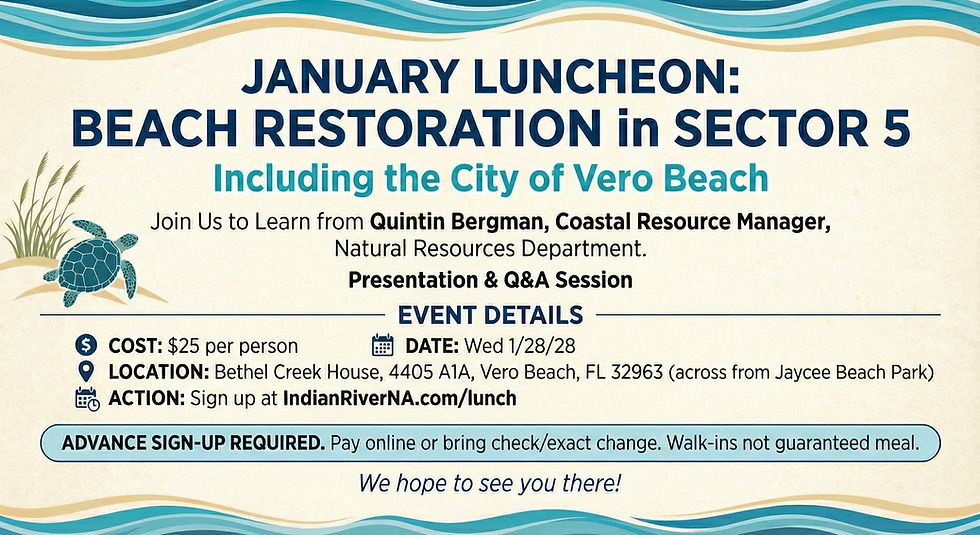Urge Gov. DeSantis to veto HB 337, HB421/HB 1101, and HB 487
- IRNA

- May 1, 2021
- 3 min read
This year, the Legislature passed a lot of bills that the IRNA does not support. All sorts of organizations have probably asked you to reach out to our elected officials to ask them to support or oppose certain bills. Sadly, a lot of terrible bills, which will be costly not only to local governments but to you individually, have passed this session. More bills may be passed before the end of the session today, April 30th. And, as it ends, our advocacy moves from our senator and representative to Gov. DeSantis. We may “call you to action” again to ask him to veto certain bills.
Please join us in urging Gov. DeSantis to veto HB 337, HB421/HB 1101, and HB 487. Let him know that you:
Do not want to be further financially burdened with paying for the cost of new development
Want your community to retain the ability to plan for community resilience, natural resource protection and more without additional costly legal challenges that ultimately would be paid for by taxpayers
Want the state to continue its current process to review development proposals for impacts on natural lands and water, roads and more
You can reach Gov. DeSantis at 850-717-9337 or governorron.desantis@eog.myflorida.com. As always, calls are best.
Last year, Gov. DeSantis was receptive to your appeals and vetoed SB 410 which would have led to high-density development in designated rural areas. We trust his commitment to managing the impacts of growth and sea level rise and reducing the burden on taxpayers will lead him to veto this year’s damaging legislation.
We sincerely appreciate your ongoing support,
Indian River Neighborhood Association Board of Directors
Bills Background
HB 337 on impact fees will curtail the amount that local government can increase impact fees charged to developers for the cost of roads, sewer lines and other infrastructure necessitated by that new development. HB 337 makes it virtually impossible for local governments to require that new development pays its own way. Impacts: Existing residents will shoulder even more of the costs associated with new development through raised taxes, declining roads, parks, and other public infrastructure, or both.
HB 421 & HB 1101 on “property rights” will have a chilling effect on the ability of local governments to enforce their comprehensive plans and land development regulations and adopt new provisions related to community resilience and other critical issues. While Florida already has among the strongest property rights laws in the nation, this bill makes local governments even more vulnerable to legal challenges over planning decisions. It also will have a very chilling effect on local governments that want to better plan to avoid future development in areas at high risk for sea-level rise and flooding. This bill could also have the unintended consequence of subjecting local governments to legal challenges (and major financial settlements) for planning decisions made decades ago. Impacts: Increased taxes due to local governments being required to pay large settlements for numerous legal challenges; less planning protection for natural lands and waters; a declining quality of life; and reluctance to plan for community resilience due to local government concerns about potential legal challenges and settlement costs.
HB 487 on small-scale amendments will reduce oversight of proposed development projects. Currently, the State acts as a “back-stop” with the ability to review certain developments for their impacts on the environment, public services and quality of life. HB 487 would increase by five-fold the size of developments that can skip a thorough state review — as many as 50 acres in urban areas and 100 acres in rural areas. Impacts: Due to this legislation, there will be less opportunity for citizens and state agencies to raise questions about environmental, transportation and other impacts of proposed development, and see those concerns remedied without filing a legal challenge.




Comments